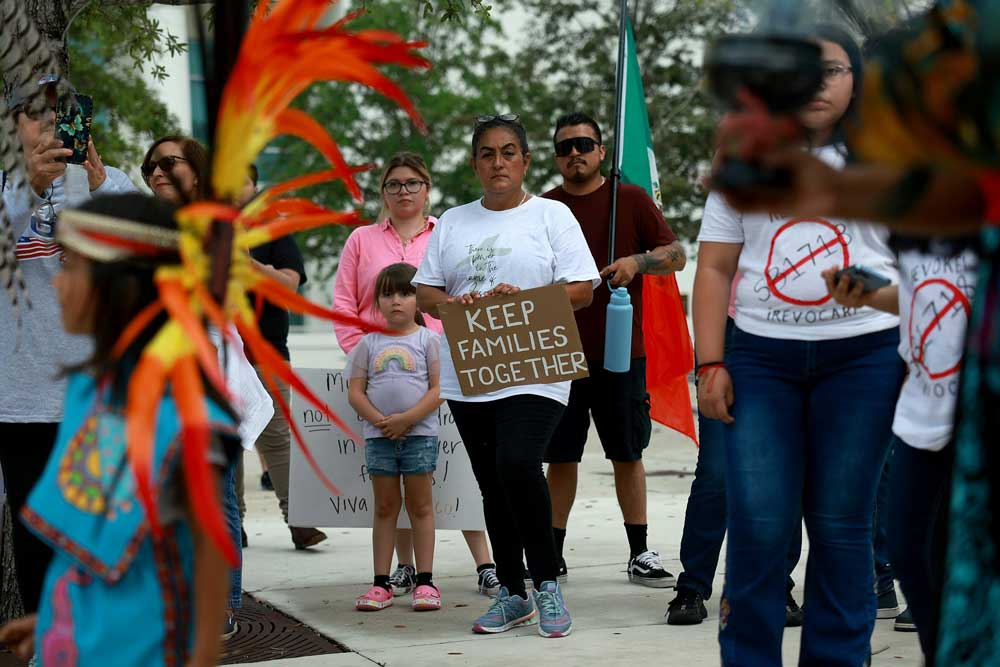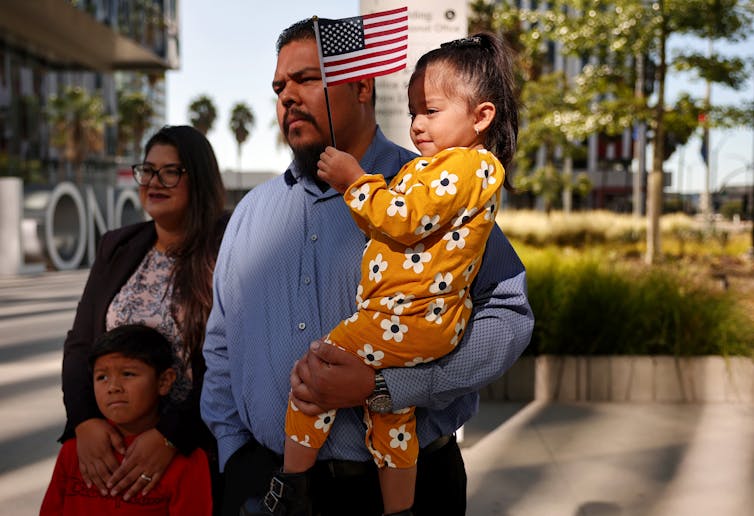
By Jane Lilly López and Kristina Fullerton Rico
Rodrigo Salazar is a man who entered the U.S. without a visa and has been living in the country without legal status ever since. Because of this, Rodrigo, who asked that we not use his or his wife’s real names in order to protect their identity, cannot advance from low-paying jobs at restaurants and car washes.
His wife, Carmela, is a U.S. citizen, but she is also facing career limitations. Carmela doesn’t feel safe moving to a place where she could get a higher-paying job. She worries that Rodrigo’s lack of legal status would be more obvious in a city with a smaller Latino population, which would put him at risk for arrest and deportation.
The entire Salazar family, including their two children, live with the constant fear of family separation if Rodrigo is deported.
Immigrants like Rodrigo, who are living in the U.S. without legal status but are married to U.S. citizens, will now have protection from deportation, President Joe Biden announced on June 18, 2024. In order to qualify, they must have arrived 10 or more years ago and be married to a U.S. citizen. Those who meet these criteria will be able to get work permits and can get on the pathway to citizenship while working and living in the U.S. legally.
The Biden administration estimates that about 500,000 immigrant spouses of citizens will be protected from deportation with this policy change. The policy will also apply to approximately 50,000 U.S. citizens’ stepchildren who are living in the U.S. without legal immigration status.
We are migration scholars who study mixed-citizenship marriages – meaning some family members are citizens or have the legal right to stay in the U.S., while others do not – and the consequences of being undocumented. Our research shows that when one family member lacks legal immigration status in the U.S., the family as a whole assumes an undocumented status.
When one family member cannot safely travel, work or access health care, all family members suffer. The opposite is also true. When a family member is able to shift from living without legal status in the U.S. to getting legal status, the lives of the entire family improve.

Mandel Ngan/AFP via Getty Images
A shift in immigration policy in the 1990s
Generally, having an immediate family member who is a U.S. citizen gives a foreign citizen the chance to live legally in the U.S. with permanent residency and a pathway to citizenship.
For most of the 20th century, all spouses of U.S. citizens who met the legal standards for qualified marital relationships were able to become citizens through a relatively straightforward process, but that changed in 1996.
A 1996 law called the Illegal Immigration Reform and Immigrant Responsibility Act imposed harsh penalties for people living in the U.S. without legal immigration status. One of the penalties is a 10-year “bar to re-entry” for anyone who has lived without a visa in the U.S. for one year or more. This ban goes into effect as soon as that individual leaves U.S. territory.
Technicalities create a divide
A consequence of this 1996 law was that getting a green card, which is an identity document that gives someone legal permanent residency in the country, became dependent on whether an immigrant entered – and remained in – the U.S. with or without a visa.
This change in the law produced a stark inequality in U.S. citizens’ ability to legally sponsor their immigrant spouses for permanent residency.
If an immigrant spouse of a U.S. citizen has overstayed a visa, this person can apply for legal immigration status – through their spouse – from within the U.S. In these cases, the spouse does not have to leave U.S. territory and is not subject to the 10-year ban.
In contrast, if a U.S. citizen’s spouse entered the U.S. without a visa or other legal permission, they must leave the country for the final step in their legal immigration application process. But when they leave the country, their 10-year ban automatically goes into effect.
This means that although every U.S. citizen’s spouse, including those lacking legal immigration status, technically qualifies for legal permanent residency, some of them will have to spend a decade or more outside the country before they can actually get a green card.
As a result, over the past few decades, millions of immigrants who were living in the U.S. without legal permission but were married to U.S. citizens have not gotten legal immigration status.
While the 10-year bar applies only to immigrants without legal status, in practice it also profoundly affects their citizen spouses, too.
In these cases, citizens married to immigrants without legal permission to be in the U.S. have two difficult options. They can resign themselves to a life of fear and limitations in the U.S., including the ever-present threat of their spouse’s deportation, or they can give up living in the U.S. altogether for a decade or more.

Mario Tama/Getty Images
The impacts of Biden’s immigration policy changes
The Biden administration has connected this new executive action on families to its recent announcement that it will heighten restrictions for seeking asylum, which scholars have called a ban on asylum.
The administration said in a press release that it both wants to “secure the border” and expand “lawful pathways to keep families together.”
Under this new policy, immigrant spouses who entered the country without a visa before June 17, 2014, will be allowed to “parole in place,” which is similar to a policy that benefits military veterans’ immigrant spouses who lack legal immigration status in the U.S. Parole in place means that these immigrants will have authorization to work and increased protection from deportation.
Parole in place will also allow immigrant spouses of U.S. citizens to have their immigration applications processed within the U.S., whether they arrived with or without a visa. This means they will no longer need to leave the country for 10 years or more if they entered the U.S. without a visa.
Having the legal right to work in the U.S. will allow these immigrant spouses to find jobs that better match their education and skills. Some estimates suggest that this could increase an immigrant’s wages anywhere from 14% to 40% more than what they currently earn.
The executive action will also yield economic benefits for the communities where mixed-citizenship families live.
Economic analyses measuring the impact of expanding work authorization and access to citizenship predict that this will create new jobs, boost incomes across communities, increase local and federal tax revenues and encourage ongoing economic growth.
As scholars of migration, we believe that this executive action is an important step toward guaranteeing that U.S. citizens who marry immigrants do not end up experiencing negative consequences because their spouses cannot legally live, work or vote in the U.S. It will also prevent the de facto deportation of U.S. citizens alongside their noncitizen spouses.
In essence, this policy change benefits American families and protects the rights of U.S. citizens to marry the person they love, keep their families together and even live in their own country. Beyond helping families, this change will have far-reaching economic benefits for the communities – and country – where they live.
![]()
Jane Lilly López is Assistant Professor of Sociology at Brigham Young University. Kristina Fullerton Rico is Research Fellow at the Center for Racial Justice at the Ford School of Public Policy, University of Michigan.





























JimboXYZ says
“10 or more years ago.” So Biden’s really doing nothing for the undocumented that crossed & married under his administration. Don’t have a problem with that, but by the same token he’s not really doing anything much is he ? More of the same, underpromise for the appearance of an overdeliver with Biden. Make ’em & leave ’em feeling like he did something for them, without really giving them anything.
Al says
Another PR from Biden. Why do we have laws if they mean nothing. What other laws can we screw up like this:
Rob a bank after 10 years your free to keep the money.
Murder and hide for 10 years your okay.
The problem that senile jerk in the Whitehouse is facing is that he’s running out of stuff to buy votes with. In the past week there have been cops shot by illegals, a young girl raced by one and two people killed in a traffic crash. We have enough of these problems with our citizens why do we have to import more.
Before the accusations of anti immigration start I’m a product of immigrants. They came here properly and did things right. These new ones seem to say I’m here deal with it, and we should deal with them by immediately sending them back.
Been There says
Well, there are statutes of limitations on most crimes.
endangered species says
will be comical when the banned climate change creates hundreds of millions of more displaced people, can only hope any other country will treat our displaced like we treat theirs.
Whats the path to become a citizen? Buy your way in is the only one I know. if your poor just jump the fence and run not many other options.
Judith Michaud says
Those who oppose immigrants should volunteer to take the jobs they do, like working the fields in a 100 degree weather with nothing more than a port a potty to use. Immigrants do not take the jobs away from Americans ! No one wants the jobs they are willing to take just to feed their families ! Since tRump our country has become so hateful and racist and this is what it is all about ! How sad!
feddy says
Immigrants that come legally or illegally?